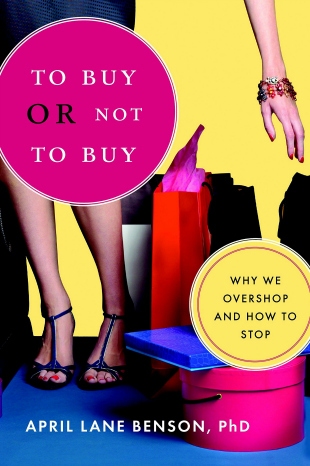April Lane Benson is a nationally known psychologist specializing in the treatment of compulsive buying. She has appeared on the Today Show, Good Morning America, and the CBS Evening News. According to a 2006 study conducted by the Stanford University School of Medicine, 5.8 percent of U. S. adults are overshoppers — at least 17 million people. How can this phenomenon be explained? Benson points to the enormity of consumerism as a major factor in our lives with all the advertising, emphasis on credit-cards (in 2006, 9.2 billion credit-card offers went out to Americans), and shopping as a major leisure activity. The second explanation revolves around overconsumption or affluenza.
Benson notes that compulsive shopping is based on low self-esteem, insecurity, and difficulty handling negative moods. Material goods become a way of measuring the good life. Of course, just the opposite is true; as psychologist Paul Wachtel pointed out long ago, the more you believe that happiness comes from material wealth, the more likely you are to be depressed, distressed, and anxious and the less actual well-being you're likely to experience.
To Buy or Not To Buy is an accessible and thorough interactive guidebook to the problem of compulsive shopping. It contains an overview of this addiction and a large cross-cut of tips, tools, techniques, and strategies for dealing with it. Readers are asked to fill out a personal history of shopping, spending, and money, looking at family influences, brainwashing by the media, etc. There is also a section on triggers to overshopping and aftershocks or undesirable consequences.
Benson goes on to suggest mindfulness about becoming financially fit through the elimination of credit card debt and an emphasis on saving money. This will be hard given these two statistics: three out of every five Americans who carry credit cards have credit card debt (half of them owe more than $6,000 and a full 13 percent owe more than $25,000), and the United States has the lowest rate of savings in the entire Western world. Benson provides plenty of advice on countering the pressure to consume, tips on mindful shopping, and ways to enlist the body, heart, mind, and soul to balance our desire for material things. She concludes with three spiritual approaches that can be very helpful in reshaping our ideas and habits of shopping: the cultivation of "true wealth," the consideration of voluntary simplicity, and the contemplation of wabi sabi. Here's a final thought:
"Enough makes life rich; too much leans toward misery. But in our culture, we're led to wolf down more than we can digest. We supersize work and ambition just as unhealthily as we supersize fast food. In the process, our intuitive balance, our instinct for knowing how much is enough, is thrown off. Regaining it involves clear seeing, compassion toward yourself, restraint, and the capacity to be still in the present moment, with nothing added."
